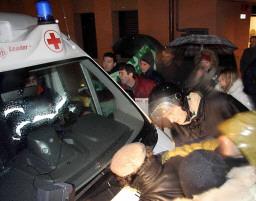Italy was split Tuesday as a woman who has been in a vegetative state for 17 years came closer than ever to ending her life in accordance with a landmark right-to-die court ruling and what her father says were her wishes.
The Vatican's health pointman, Cardinal Javier Lozano Barragan, stressed that removing 38-year-old Eluana Englaro's feeding tube was ''an abominable act of murder'', adding that it was ''inconceivable to think about killing a person in this way''.
''What they want to do is add to her suffering by causing her death by thirst and hunger, something inconceivable. What it amounts to is an inhuman act,'' Barragan said.
He called on the ''Christian consciences'' of doctors to refuse to remove the tube at the Udine clinic which has offered to help Eluana end her life, and where she was transferred in the early hours of Tuesday morning.
Italian Bishops' Conference (CEI) Secretary-General Mariano Crociata reiterated that the removal of the tube is ''euthanasia'', but at the same time expressed sympathy with Eluana's family for being ''so strongly tested''.
Health Minister Maurizio Sacconi, who in December managed to thwart another clinic's offer to help Eluana die by issuing a last-minute guideline stating that the removal of feeding tubes from patients in a vegetative state is ''illegal'', said he was ''evaluating the situation from a formal point of view''.
Sacconi did not dismiss the possibility of new legal measures to prevent medics from ending Eluana's life.
Health Undersecretary Eugenio Roccella stressed that the ministry would monitor the situation to ''ensure that national health service rules are respected'', while adding there was ''objective incompatibility between (these rules) and the application of the court ruling''.
A second health undersecretary, Francesca Martini, reiterated the validity of Sacconi's guideline, despite the fact that observers have said it does not apply in Eluana's case because of the definitive court ruling.
Other politicians were more reserved, with Premier Silvio Berlusconi saying he didn't ''want to comment'' in response to journalists who asked him for an opinion on the case.
Walter Veltroni, the leader of centre-left opposition Democratic Party, said politicians should be ''discreet'' in ''delicate issues that regard the life and death of a real person'', but added that there were nevertheless multiple court rulings that ''should be respected''.
House Speaker Gianfranco Fini called for the wishes of Eluana's parents to be respected.
''I envy people who are certain about the Englaro case,'' he said.
''Personally I have no certainties, neither religious nor scientific. I have only doubts, and one above all: what and where is the line between being a living being and a vegetable? I think only Eluana's parents have the right to reply, and I feel it is right to respect that reply''.
Senate Speaker Renato Schifani reiterated a call by Italian Giorgio Napolitano for parliament to pass a law on living wills, which allow people to stipulate what medical treatment they want in the event they later become unable to make a decision themselves.
''Everyone must put aside their different polticial visions to resolve quickly a problem that leaves every conscience divided and uncertain, whatever the decision that we believe is right may be,'' Schifano said.
There is currently no legislation governing living wills in Italy, where the topic is particularly controversial due to strong opposition from the Catholic Church.
In a poll by weekly magazine Panorama last week, 58% of people said medics should remove Eluana's tube, while 30% believed treatment should be continued.
Eluana has been in a permanent vegetative state since a car accident when she was 22.
There are currently between 2,000 and 2,500 other people in vegetative states in Italy.









